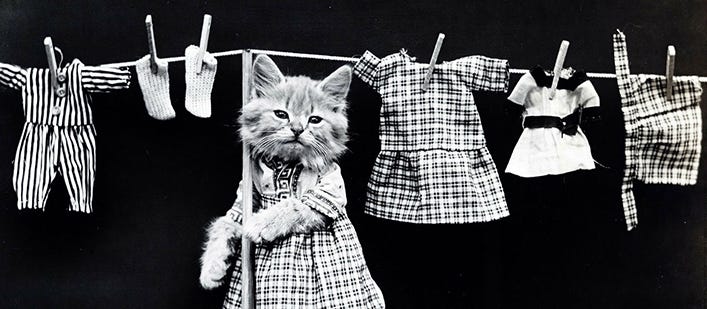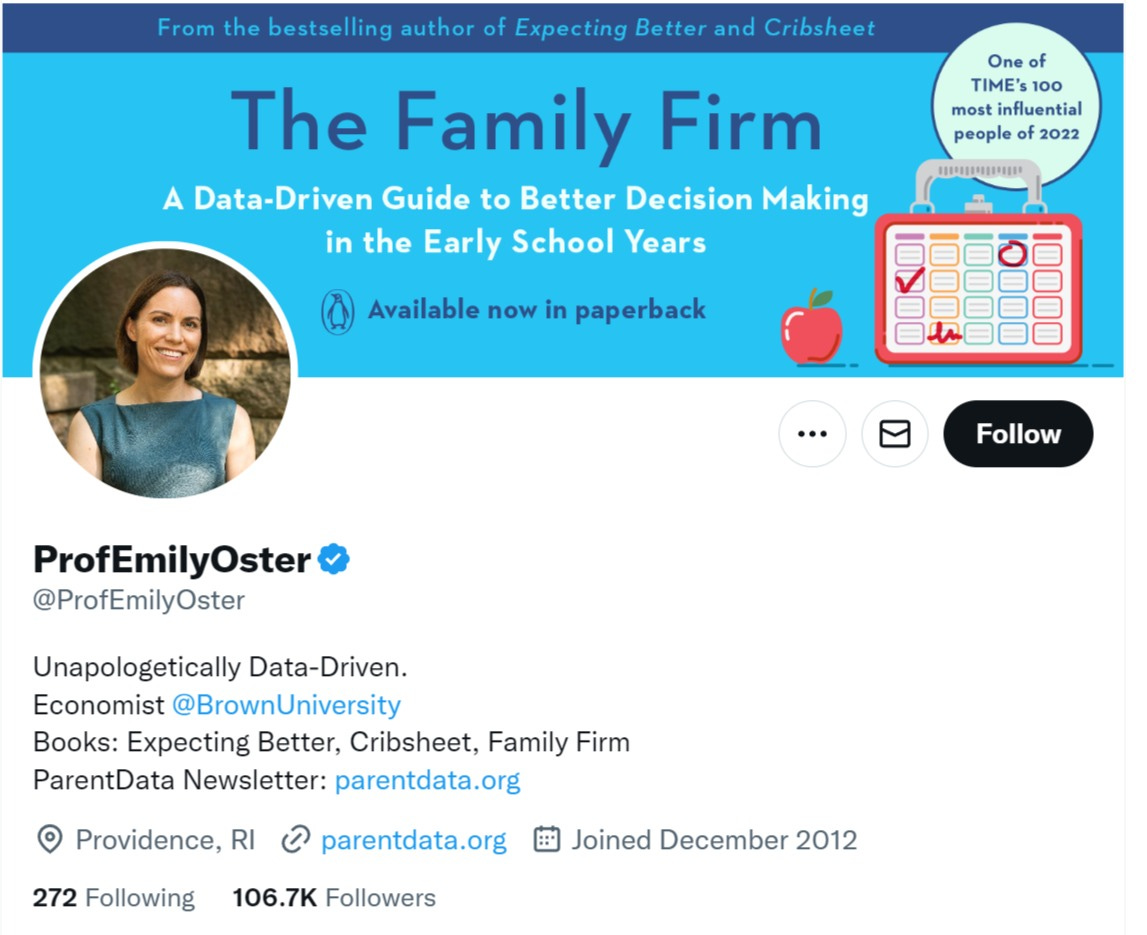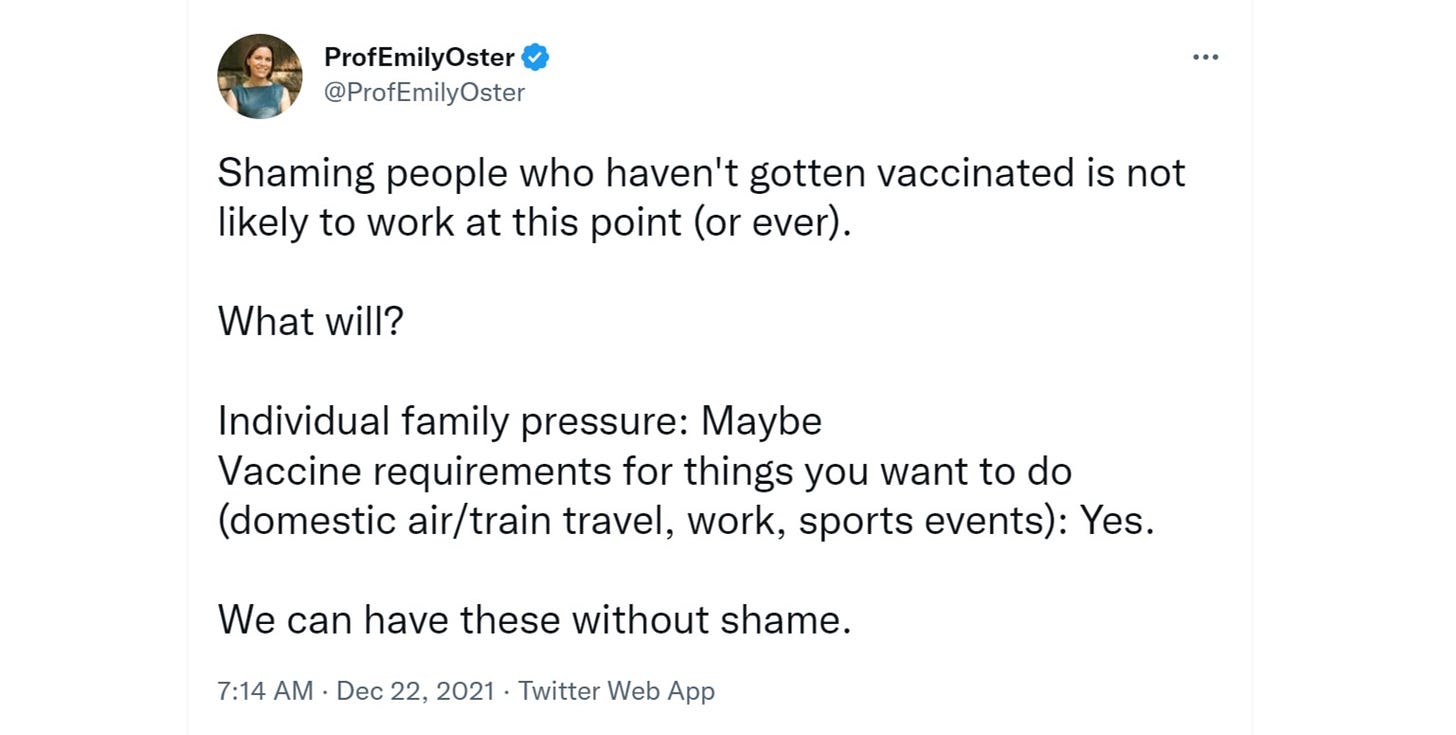emily oster's no good, really bad, terrible idea
"when we were in the dark about covid" is not a useful excuse for bad behavior
brown university econ professor emily oster is out with a new missive in the atlantic (where else?) and it seems to be generating quite a lot of heat.
perhaps this is because it is so seemingly self-serving and tone deaf.
after all, this is quite the spicy take from the woman who did so much to gather so much useful data on masking in schools only to disavow the obvious conclusions it led to because the orthodoxy of those around her at brown U would not allow "masks don't work to stop covid" to be reported.
just to be clear, emily is not advocating forgiving “those who deliberately spread misinformation” (though she does seem a bit confused about just who that might be) but her “we were all in the dark and people said lots of things and some wound up right and some wrong and we all just need to get over it and move on as recrimination is not useful” take rings hollow and false here.
what does this serve?
why should we forgive those who through stupidity, cupidity, and fear spent 3 years denying 100 years of evidence based science to attack our lives and livelihoods?
oh, no worries! i'm sure you had your reasons?
you were "just following orders"?
you were just doing what the authorities said?
because i seem to remember a whole pile of excuses that sounded an awful lot like that being rejected back in the late 40’s.
and i must agree with that take and take issue with emily.
it is precisely BECAUSE following vicious, evil orders is so easy in times of fear and that humans break and bow to authority with such ease that there must be sharp penalties, reputational and otherwise for so doing.
otherwise, you're just greasing the rails for next time.
it’s the low energy path of submission and freeing it from consequence serves only to render it a path more followed.
ignorance of the law is not excuse. neither is ignorance of ethics or epidemiology.
in the end, we all stand culpable for what we choose to do based on whatever information we have and this is why, to my mind, those with little information should so stringently avoid doing radical and dramatic things.
isn’t that just basic sense?
so why would we seek to reduce the penalties for having violated such a simple tenet?
even if we accept this “we were in the dark” line of reasoning it still makes no sense.
we were not in the dark. we had 100 years of evidence based pandemic and epidemiological guidance and guideline upon which to rely. some tried to follow these bodies of canon and were shouted down by those seeking to do exactly what that guidance admonished against. that is lack of knowledge abrogating actual knowledge and panic driven superstition superseding evidence. equating those two viewpoints as “equivalent” is pure nonsense.
even if truly no one knew anything, then this is a reason for humility, not stridence. the base case is always “respect others and their rights. do not panic. don’t do anything crazy or drastic without a very sound reason.” that’s not what happened. a bunch of terrified anti-science loons got loose with global government and pushed literally unprecedented in human history programs of societal and economic upheaval that flat out broke the world while, predictably, having zero effect on the pandemic. guys, you took you lead from china. china.
the precautionary principle does not state “every time you get scared, do the most radical thing you can think of it if feels like safety” that is precisely what it warns against. such excursions into superstitious supplication of pseudoscience are not evidence based epidemiology. they are not even sanity. and again, calling that an equivalent viewpoint to “we need strong, data-driven evidence to take such outlandish actions” (presuming they are permissible at all, itself deeply questionable) is pure nonsense.
the presumption of prerogative to force upon others the unfounded desires of “those in the dark” fails inherently on every metric germane to sustaining a free society. “we didn’t know, so we took your rights away just in case” is not much of justification. this lays claim to “emergency powers” of dictatorial nature and is exceedingly dangerous as a societal foundation. it’s also incompatible with the basic idea of a republic in which the rights of the individual stand paramount to the whims of the state or the mob. this ought be especially so in emergencies with low information for what could be more likely to work vast harm than great power to coerce usurped and wielded by “those in the dark”? again, this is not a viewpoint that can be granted equivalence to a system that respects rights. doing so is, yet again, pure nonsense.
so, this all fails in epic fashion. this idea of “we didn’t know so how about a little amnesty for all the crazy and damaging things we did to you in direct opposition to your own desires” is just not going to wash.
that laundry is too dirty.
this is especially so coming from emily because in her case it’s so clearly not even true. it feels an awful lot like the desperate play of someone who has realized just how far on the wrong side of the line she wound up despite knowing full well what the right side was.
“let’s not pull any more threads to see where they go” said the lady whose sweater was rapidly gathering around her feet…
oster gathered and published the very data (linked above and here) that shows the utter inefficacy of masks in schools and then cravened out of reporting it honestly for fear of social and career consequences it was bringing down.
this makes it seem odd that she so champions “those in the dark” as she herself was clearly not one so blinded.
she claims to be “data driven” but, in the event was, in fact, driven from the data and back into alignment with orthodoxy.
and this is a high status, large platform player. if she cannot stand up to the sorts of panic pressure to conform to regimes of misinformational messaging then what hope have many others?
of all the people who should have had the confidence to follow data over diktat, should not a trained professor of data handling rise to the fore?
but this failed. and if we would avoid such failure in the future, perhaps a bit of culpability ought be spread around.
as an economist, surely ms oster must understand incentives. if there is no cost to having acted poorly, rashly, and without consideration or information despite the ill effects it had on others, are we not just subsidizing more such antisocial activity in the future?
i get to run amok, wreck your life, then call "olly olly oxen free" and skate on blame?
sorry about your biz, your kids, the vilification, and the dodgy jabs?
collateral damage...
what kind of system is that?
it's literally calibrated to maximize misbehavior.
(and don’t even get me started on folks like NIH and CDC and FDA who were NOT in the dark but knew full well they were cutting corners, publishing fraud, and telling lies about everything from masks to vaxxes to lockdowns and covid origins.)
“we trusted them so what we did to you because of it is not our fault” is not a real excuse. this is the exact form of authority submission we must build systems to be robust to, not to excuse away.
what emily suggests seems to me to be a recipe for doing this all again.
look, i’m not saying you have to hate someone forever for being fooled, but to trust them in the future is another matter. that must be earned.
but this gets more complex: being wrong is one thing. OK, you made a mistake. and this, i can forgive so long as it was YOUR mistake. but when you take that mistake and make it mine by forcing upon me actions and restrictions to which i do not consent and to threaten the lives and livlihoods of me and mine because you’re running around half-cocked and have no respect for the rights of others, well, that’s something altogether different, isn’t it?
the rights of a free people do not end where the fears of fraidycats and temptations of tyrants begin.
getting a disease wrong is one thing, but presuming the coercive dispensation to take whatever your “conclusion” is (especially if you are “in the dark”) and force it upon the rest of us because it makes you feel less frightened (or perhaps allows you to savor the dark frisson of being beastly to others while telling yourself you’re a good person for doing it) is not something you get amnesty for.
there is a sleight of hand in the thinking here like somehow having misunderstood a pandemic excuses the mass scale abrogation of rights and reason.
it doesn’t.
such ideas are anathema to the persistence of a free society.
and this is not where team oster came down.
it’s, quite literally, an assumptive power grab that tries to blow the idea of “we are entitled to do this” by you by claiming “well, we did it meaning well and if we had been right about X instead of wrong, it would all have been worth it! in the dark, omelets, eggs, you know!”
no. i don’t know.
even had they been right on covid and NPI’s or anything, they still had no right to do this. they had no right to take over media, social and otherwise and censor it. that is “the dark.” they had no right to lock you down, mask you up, and force an ill-tested and ill-effective jab on people as predicate for basic freedoms.
and all the people who favored that, who brayed and cheer led for it, they are guilty too. and i just cannot see “just dropping the matter” because they’d like it to go away now.
if you got rolled by this, got jabs you did not want, and suffered as many did, well, so long as you did not advocate forcing this on others, you already have my forgiveness. you were a victim here.
but as soon as you cross the line into advocating coercive policy or willful data suppression, that’s a whole separate issue.
being wrong is no crime nor even is being bullied into acquiescence.
but forcing others to join you is.
knowingly suppressing data and spreading lies is.
i'm sure that many who now find themselves way on the wrong side of so many issues rapidly coming to light as fraud and failure would like amnesty.
but that is no reason to grant it.
it may, in fact, be strong reason to withhold it.
if you wielded the whip hand of of the covidian crusader i’m sorry, but i don’t care if you were “in the dark” as that is no excuse. it stands rather as indictment.
having done so out of ignorance (or worse the sort of dark desire to act the dictator or demagogue by assuming a faux moral mantle to vilify and attack others) makes you a hazard and precisely the sort of actor that ought be penalized, not accommodated.
society must develop an immune system to you.
forgiving such would be past enabling and into ennobling anti-social action and technocratic science perversion.
that's not a world you wanna live in.
so, sorry, but not planning to start trusting the folks who got this so wrong again any time soon. that “amnesty” will need to be learned in the school of “actions have consequences.”
forgiveness for such acts must be earned, not hand waved into being.
“let’s not bicker over who killed who” in the heat of the moment is not a philosophy for real recovery.
it’s perpetuation of the problem.












She doesn't even apologize! I'm willing to forgive some people who were awful. I really am. But they have to own what they've done and reckon with it. They can't just "declare amnesty" and be done with it! The level of arrogant entitlement on display here just makes it all worse.
No thanks, I’d rather see a full fledged Nuremberg trial to assure us that things like crimes against humanity won’t never again go unpunished.